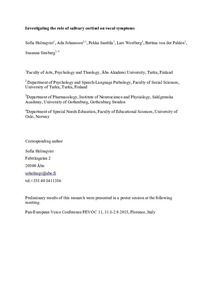Investigating the Role of Salivary Cortisol on Vocal Symptoms
Sofia Holmqvist-Jämsén; Ada Johansson; Pekka Santtila; Lars Westberg; Bettina von der Pahlen; Susanna Simberg
Investigating the Role of Salivary Cortisol on Vocal Symptoms
Sofia Holmqvist-Jämsén
Ada Johansson
Pekka Santtila
Lars Westberg
Bettina von der Pahlen
Susanna Simberg
AMER SPEECH-LANGUAGE-HEARING ASSOC
Julkaisun pysyvä osoite on:
https://urn.fi/URN:NBN:fi-fe2021042717717
https://urn.fi/URN:NBN:fi-fe2021042717717
Tiivistelmä
Purpose: We investigated whether participants who reported more often occurring vocal symptoms showed higher salivary cortisol levels and if such possible associations were different for men and women.Method: The participants (N = 170; men n = 49, women n = 121) consisted of a population-based sample of Finnish twins born between 1961 and 1989. The participants submitted saliva samples for hormone analysis and completed a web questionnaire including questions regarding the occurrence of 6 vocal symptoms during the past 12 months. The data were analyzed using the generalized estimated equations method.Results: A composite variable of the vocal symptoms showed a significant positive association with salivary cortisol levels (p < .001). Three of the 6 vocal symptoms were significantly associated with the level of cortisol when analyzed separately (p values less than .05). The results showed no gender difference regarding the effect of salivary cortisol on vocal symptoms.Conclusions: There was a positive association between the occurrence of vocal symptoms and salivary cortisol levels. Participants with higher cortisol levels reported more often occurring vocal symptoms. This could have a connection to the influence of stress on vocal symptoms because stress is a known risk factor of vocal symptoms and salivary cortisol can be seen as a biomarker for stress.
Kokoelmat
- Rinnakkaistallenteet [29335]
